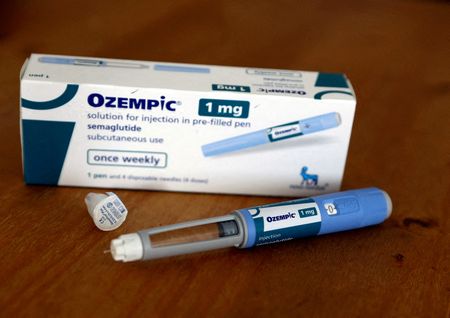By Andrew Silver and Ludwig Burger
SHANGHAI (Reuters) -A drugmaker in China has developed a biosimilar version of Novo Nordisk’s popular diabetes drug Ozempic and applied for approval to sell it there, in a potential challenge to Novo’s expansion plans in the country.
Hangzhou Jiuyuan Gene Engineering said on Wednesday in a post on its official social media account that it was seeking approval to sell the drug, which it calls Jiyoutai, to control blood sugar in patients with type 2 diabetes.
Novo’s patents in China on Ozempic and related drug Wegovy are set to expire in 2026, according to its annual report.
Novo’s Ozempic sales in China more than doubled last year to 4.8 billion Danish crowns ($694 million), accounting for 5% of global Ozempic sales of 95.7 billion crowns.
Ozempic became the world’s best-selling diabetes drug last year, but demand is largely driven by people seeking to lose weight because its active ingredient, semaglutide, is the same – only at a lower dose – as in popular weight loss drug Wegovy.
As a result, cheap copies of Ozempic in Asia’s largest market could dampen demand for Wegovy, which Novo plans to launch in China this year with a focus on patients paying out of their own pockets.
In response to questions about the potential impact on its business in China, a Novo spokeswoman said: “We hope to see continued support and protection of innovation in China as this will stimulate companies’ motivation to develop innovative medicines and bring new treatments to patients.”
Approval for Jiyoutai would make the injectible drug China’s first locally developed biosimilar semaglutide drug. A biosimilar drug has a structure that closely mimics an existing biologic drug but is not exactly alike.
The application for approval comes amid surging demand for semaglutide that is far outpacing supply globally.
Jiuyuan Gene, which is majority owned by China’s Huadong Medicine, completed a late-stage clinical trial in China last year comparing its semaglutide injection with Ozempic in 476 patients, according to a clinical trials registry.
The company did not immediately respond to a Reuters request for comment on Jiyoutai’s safety or efficacy data.
“Unless the competent court finally decides this patent is invalid, we will not be able to commercialize JY29-2 (Jiyoutai) before the expiration of this patent,” Jiuyuan Gene said in a draft filing to the Hong Kong stock exchange in January, referring to Novo’s Ozempic patent.
Jiuyuan Gene Engineering collaborated with its top shareholder Huadong Medicine to develop another diabetes drug which is approved in China.
Also on Wednesday, Novo warned that starter kits of Ozempic would still not be available in Germany during the second quarter, as shortages in Europe drag on.
($1 = 6.9189 Danish crowns)
(Additional reporting by Ludwig Burger in Frankfurt and Jacob Gronholt-Pedersen in Copenhagen; Editing by Christian Schmollinger and Mark Potter)










